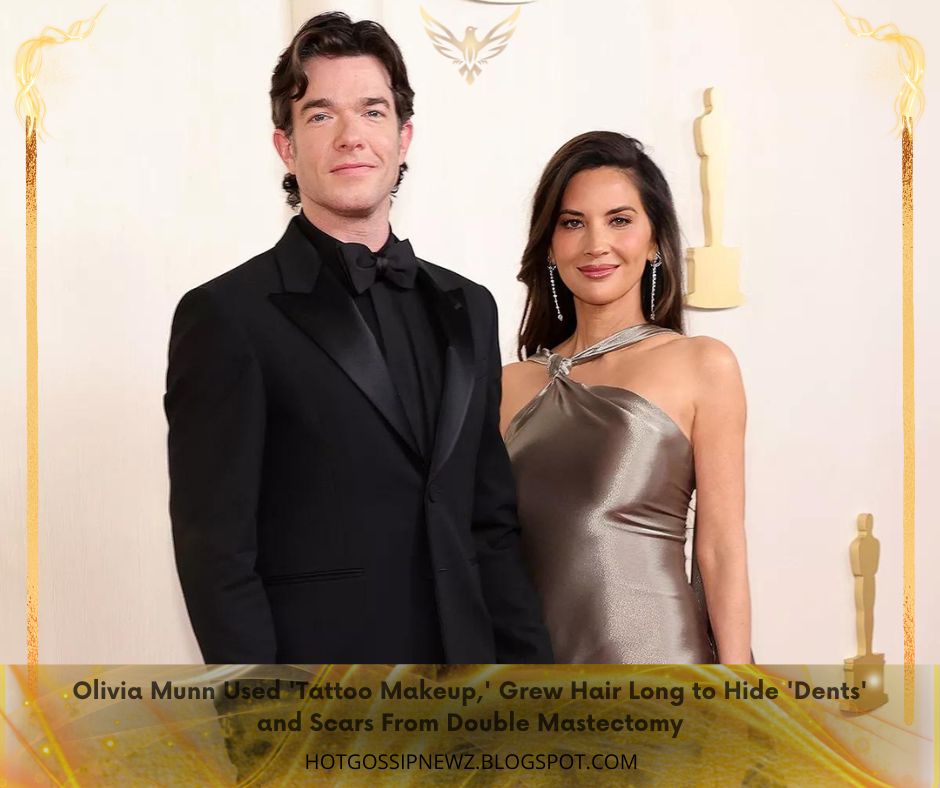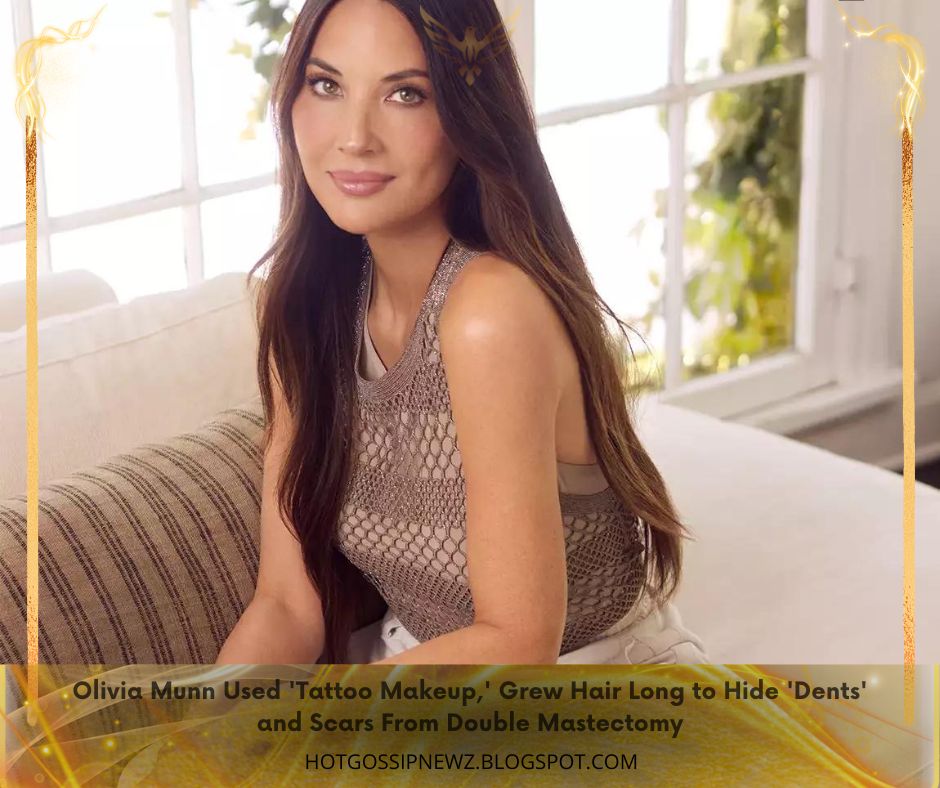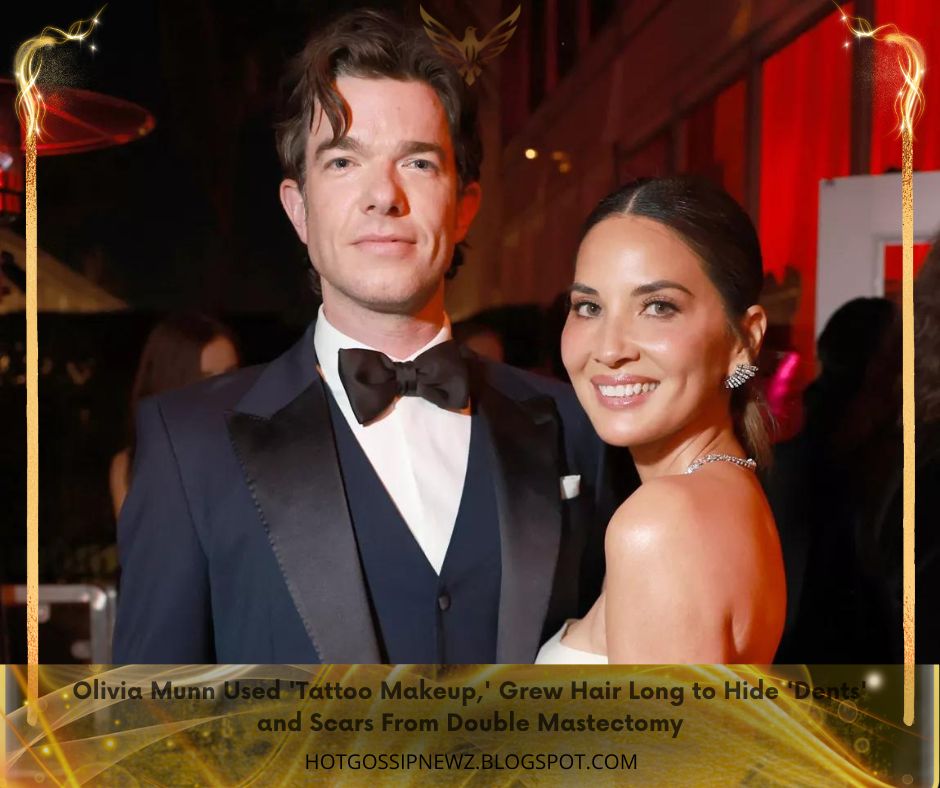Olivia Munn is opening up about the “battle wounds” left behind from her breast cancer journey.
The 43-year-old actress was diagnosed with breast cancer in April 2023 and underwent a double mastectomy 30 days later. In the months following her first three surgeries and eventual reconstruction, Munn had to learn to adapt to her new body. Attending the 2024 Oscars and Vanity Fair Oscars after party posed a particular challenge, as at that point, she had not yet shared her diagnosis with the world.
“I have some divots and dents on one side of my body near where the lymph nodes were, and they had to really dig out,” Munn tells. “And I've been wearing some dresses on the red carpet that made me a little stressed out at times.”
The star adds that her makeup artist, Diane Buzzetta, “learned how to do tattoo-type makeup” ahead of appearances like the Oscars, which she attended with her partner John Mulaney. The couple share a two-year-old son, Malcolm.
At the Academy Awards, Munn wore a halter-style chrome column gown by Fendi and later changed into a white strapless dress.
“We're trying to really cheat where the dents are and how to make it really smooth and cover up everything, so that I could wear it,” she recalls. “It's not something I can do by myself, but knowing that there's that option for when I'm in front of the camera has made me feel a lot better about things. And then personally, the people in my life who see it don't see them as imperfections. So, that's a good feeling, too.”
“Sometimes I look in the mirror and I think, ‘Oh, my hair is so long now and it's because of this,’” she says, referring to her cancer battle. “And sometimes it makes me a little sad that I still want to hide certain aspects. But then I remind myself that those are battle wounds and I can show them what I want and I can hide them when I want.”
“I don't beat myself up for anything I'm feeling on any given day, I just let myself feel it," she adds. "There's a really nice peace that comes with that."
Though she admits it can be challenging to embrace her new body, Munn says that ultimately, she’s grateful that she “got the opportunity to fight” and is “really happy with whatever it is I look like now.”
“It’s different once you actually do the reconstruction and it's much better, but it's not the same,” she says. “And that's okay because I'm here, and I'm extremely happy that I had the option to have a double mastectomy. I'm extremely happy that I got the opportunity to fight. I was given that chance, and I know a lot of people in my situation don't have that opportunity and don't have that as an option.”
Munn, who set to begin filming her new Apple TV+ show Your Friends and Neighbors opposite Jon Hamm soon, says she’s a “different version of myself now” — and with that has come some positive changes.
“I'm much more forgiving of myself,” she says. “And it's really fun to go back to work without all of the doubt in your head… when you're acting, you really need to be able to really be in the moment.”
“I think I was always able to do it, but it was harder to do because you really have to quiet all the outside noise,” she continues. “But I'm just a lot kinder to myself, which means every day is a lot easier to take on and manage.”
The diagnosis came as a shock to the actress because her annual mammogram just three months prior had come back clear, and Munn had recently tested negative for the BRCA cancer gene. “I was walking around thinking that I had no breast cancer,” she tells. “I did all the tests that I knew about.”
Within 30 days, Munn underwent a lymph node dissection, a nipple delay procedure (a surgical procedure which spares the nipples) and a double mastectomy, followed by reconstructive surgery last fall.
Munn's lifesaving diagnosis was due to her ob-gyn’s decision to calculate her lifetime breast cancer risk score during a routing Pap smear using a free online tool called a Tyrer-Cuzick risk assessment calculator. Within minutes, Munn's results came back showing she was at high risk for breast cancer, prompting her doctor to order a MRI.
Today Munn is determined to raise awareness for other women at risk, crediting her ob-gyn's decision to calculate her lifetime cancer risk as the one that saved her life. “If it wasn’t for Dr. Aliabadi, I’d still be going through life not knowing that I had breast cancer,” Munn tells.
The Quran - Chapter Ad-Dukhan : 29 - 31
Neither heaven nor earth wept over them, nor was their fate delayed.
And We certainly delivered the Children of Israel from the humiliating torment
of Pharaoh. He was truly a tyrant, a transgressor.
Weeping of the Sky and the Earth
فَمَا بَكَتْ عَلَيْهِمُ السَّمَاءُ وَالْأَرْضُ "So, neither the sky and earth wept over them... (44:29) ". This means they did not perform any righteous deeds on earth which would weep for them when they died, nor did any of their righteous deeds ascend through the gates of heaven, so that the sky would weep on their death.
There are several ahadith which confirm that when a righteous person dies, the heaven and earth weep. Hafiz Abu Ya` la reports on the authority of Sayyidna Anas ؓ that the Prophet of Allah ﷺ said: "For every person there are two gates in the heaven/sky.
Through one of them his sustenance descends, and through the other his deeds and his conversation ascend.
When he dies, the gates remember him and weep. Then the Prophet ﷺ recited the following verse as an evidence of his statement: فَمَا بَكَتْ عَلَيْهِمُ السَّمَاءُ وَالْأَرْضُ So, neither the sky and earth wept over them...(44:29) ".
Similar reports are narrated on the authority of Sayyidna Ibn ` Abbas (Ibn Kathir). Sayyidna Shuraih Ibn ` Ubaid al-Hadrami ؓ narrates that the Holy Prophet ﷺ said:
"If a believer dies away from home where there is no one to weep for him, the heaven and earth weep for him."
On this occasion too, the Holy Prophet ﷺ recited the same verse (29), adding that neither the sky nor the earth weeps for a non-believer. (Ibn Jarir). Sayyidna ‘Ali ؓ also upholds that the heaven and earth weep for a righteous person. (Ibn Kathir).
Some scholars interpret the verse metaphorically, not literally. They say that the sky and the earth do not really weep, in the primary sense of the word.
The verse purports to say that their existence is so insignificant that when they were wiped out, it did not cause grief to anyone. In the light of the above narratives, the real weeping of the heaven and earth in this context appears to be preferable.
If the literal or primary sense of an expression is possible, there is no need to interpret it metaphorically or figuratively.
The narratives quoted above support our argument - that the verse must be interpreted in its basic sense, and not in the figurative sense.
It may be objected that neither the heaven nor the earth has any sense so that they would weep in the primary sense in which we understand it. Its rebuttal is simple:
Obviously, every member of the universe has some sense, to a higher or lower degree, as attested by the Qur'an وَإِن مِّن شَيْءٍ إِلَّا يُسَبِّحُ بِحَمْدِهِ...And there is not a single thing that does not extol His purity and praise, but you do not understand their extolling... (17:44) ".
Gradually, contemporary science - through its research and experiment - is now reaching the same conclusion.
Of course, it is not necessary for the heavens and the earth to be weeping in the same way as human beings do.
The way of their weeping would surely be different from humans but we are unaware of its reality.





























